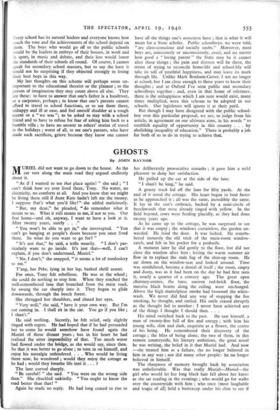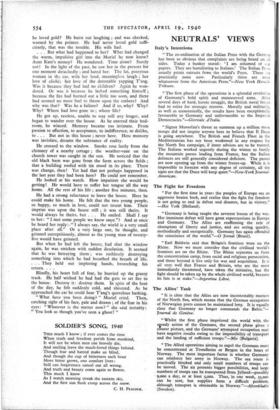GHOSTS
By JOHN RAY
MURIEL did not want to go down to the house. As the car tore along the main road they argued endlessly about it.
" As if I wanted to see that place again! " she said ; " I can't think how we ever lived there, Tony. No water, no electricity, no comforts at all. And you know that we might be living there still if Aunt Kate hadn't left me the money. I suppose that's what you'd like!" she added maliciously.
" But, my dear," he pleaded, " do remember what it meant to us. What it still means to me, if not to you. Our first home—and oh, anyway, I want to have a look at it. After twenty years, surely . . ."
" You won't be able to get in," she interrupted. " You can't go banging at people's doors because you once lived there. So not do you want to go for? " " It's not that," he said, a trifle wearily. " I don't par- ticularly want to go inside. It's just that—well, I can't explain, if you don't understand, Muriel."
" No, I don't," she snapped, " it seems a lot of tomfoolery to me."
T'ang, her Peke, lying in her lap, barked shrill assent.
For once, Tony felt rebellious. He was at the wheel ; she could do nothing to stop him. When they reached the well-remembered lane that branched from the main road, he swung the car sharply into it. They began to glide downwards, through the beech forest.
She shrugged her shoulders, and closed her eyes.
" Very well," she said, " have it your own way. But I'm not coming in. I shall sit in the car. You go if you like ; I shan't."
He said nothing. Secretly, he felt relief, only slightly tinged with regret. He had hoped that if he had persuaded her to come he would somehow have found again the Muriel of those distant years ; but in his heart he had realised the utter impossibility of that. Too much water had flowed under the bridge, as she would say, since then. So that it was better to go alone ; to turn in on himself, and enjoy his nostalgia unhindered. . . . Who would be living there now, he wondered ; would they enjoy the cottage as he had ; would they breathe life into it . . . ?
The lane curved sharply.
" Be careful! " she said. " You were on the wrong side then." She chuckled unkindly. " You ought to know the road better than that! "
Again he made no reply. He had long ceased to rise to her deliberately provocative remarks ; it gave him a mild pleasure to deny her satisfaction.
He pulled up the car at the side of the lane.
" I shan't be long," he said.
A grassy track led off the lane for fifty yards. At the end of it stood the cottage. His heart began to beat faster as he approached it ; all was the same, incredibly the same. It lay in the sun's embrace, backed by a semi-circle of beechwoods that were already tinged with yellow. In the field beyond, cows were feeding placidly, as they had done twenty years ago.
As he came up to the cottage, he was surprised to see that it was empty ; the windows curtainless, the garden un- weeded. He tried the door. It was locked. He remem- bered instantly the old trick of the main-room window- catch, and felt in his pocket for a penknife.
A moment later he slid gently to the floor, but did nor close the window after him ; letting the warm summer air flow in to replace the stale fug of the shut-up room. He sat down on the window-seat and looked around. Time was annihilated, become a denial of itself ; the room, empty and dusty, was as it had been on the day he had first seen it, nearly a quarter of a century ago. The great open chimney-corner, the bare, uneven red-brick floor, the massive black beams along the ceiling were unchanged.
Above the high mantelpiece smoke had browned the white- wash. We never did find any way of stopping the fire smoking, he thought, and smiled. His smile ceased abruptly as the thought led to another : I never have achieved any of the things I thought I should then. . . .
His mind switched back to the past. He saw himself, a man of twenty-five full of fire and energy ; with him his young wife, slim and dark, exquisite as a flower, the centre of his being. He remembered their discovery of the cottage ; the bliss of being alone, the two of them, in this remote countryside, his literary ambitions, the great novel he was writing, the belief in it that Muriel had. And now —she treated him as a failure, she no longer believed in him in any way ; nor did many other people: he no longer believed in himself.
The sharpness of memory brought back by association was unbelievable. Was that really Muriel—Muriel—the girl who would let her long black hair fall about her knees as she sat reading in the evenings ; who would go for walks over the countryside with him ; who once (most laughable and tragic of all) held a buttercup under his chin to see if he loved gold? He burst out laughing ; and was checked, warned by the pointer. He had never loved gold suffi- ciently, that was the trouble. His wife had.
. . . But what had happened to her? What had changed the warm, impulsive girl into the Muriel he now knew? Aunt Kate's money? He wondered. Time alone? Surely not! In the light of the past, he saw her in the present for one moment detachedly ; and hated her. The fat, pompous woman in th.: car, with her loud, meaningless laugh ; her love of cliché; her love of the detestable yapping T'ang. Was it because they had had no children? Again he won- dered. Or was it because he lacked something himself ; because the fire had burned out a little too soon, and there had seemed no more fuel to throw upon the embers? And why was that? Was he a failure? And if so, why? Why? Why? Where had love gone to ; where life?
He got up, restless, unable to stay still any longer, and began to wander over the house. As he entered their bed- room, he winced. Memory became too intimate. From passion to affection, to acceptance, to indifference, to dislike, to . . . But not in this house ; never here. Here memory was inviolate, dreams the substance of reality.
He crossed to the window. Smoke rose lazily from the chimney of a nearby cottage ; the weather-vane on the church tower was caught in the sun. He noticed that the old black barn was gone from the farm across the fields ; that a building roofed with tin stood in its place. There was change, then! Yet had that not perhaps happened in the last year they had been here? He could not remember.
He looked at his watch. How impatient she would be getting! He would have to suffer her tongue all the way home. All the rest of his life ; another five minutes, then.
He had a strong reluctance to leave the house. Here he could make his home. He felt that the two young people, so happy, so much in love, could not resent him. Their imprint was upon the house still ; it was still theirs. It would always be theirs, but . . . He smiled. Shall I say to her: "I met some people we knew once."? And at once he heard her reply :." I always say, the world is a very small place after all." Or a very large one, he thought, and grinned surreptitiously, almost as the young man of twenty- five would have grinned.
But when he had left the house, had shut the window again, he was stricken with sudden desolation. It seemed that he was betraying them ; was ruthlessly destroying something into which he had breathed the breath of life. . . . They held out imploring hands, beseeching his return. . . .
Blindly, his heart full of fear, he hurried up the grassy track. He half wished he had had the guts to set fire to the house. Destroy it : destroy them. In spite of the heat of the day, he felt suddenly cold, and shivered. As he approached the car he could hear T'ang's querulous barking.
" What have you been doing? " Muriel cried. Then, catching sight of his face, pale and drawn ; of the fear in his eyes: " Whatever is the matter now? " she said irritably: " You look as though you've seen a ghost! "











































 Previous page
Previous page